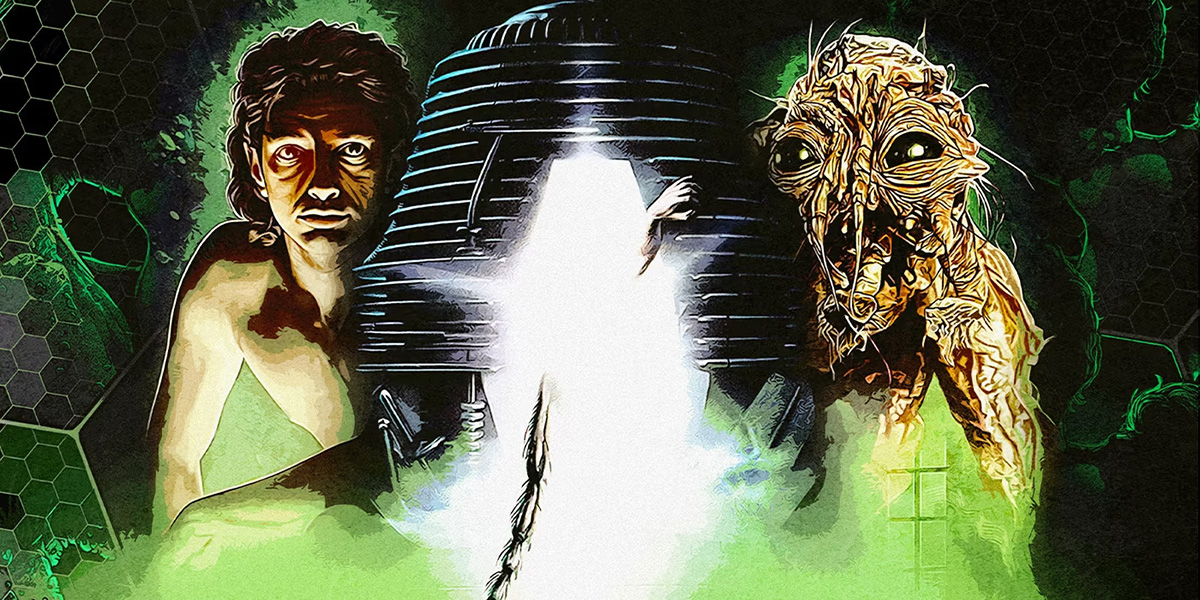Pick any one of David Cronenburgh’s films, and you’ll be sure to view something grotesque, dark, examining the human conscience and brilliant. With his 1986 version of “The Fly,” this is no different.
A loosely based remaking of the original 1958 horror film of the same name, Cronenberg takes his usual body horror concepts and applies them to the film’s remake. This psy-fi, horror and romance-themed film certainly packs a punch within its 96-minute screen time.
Through the invention of teleportation, scientist Seth Brundle, played by Jeff Goldblum, enacts his descent into madness through his craft. After going through his teleportation machine, Brundle becomes an animalistic, ill-tempered, vomiting human-fly mutation.
“The Fly” is a parable for sickness, descent and a warning against scientific audacity.
The story begins with journalist Veronica Quaife (Geena Davis) attending an event where scientific community members speak of and show off their latest creations. Shortly into the event, she meets Brundle, and the two begin engaging in romantic activities.
Brundle introduces her to the project that he’s been working on, a device that can teleport matter through space and time. However, the device still has some flukes, as it can only teleport inanimate objects.
Brundle can finally perfect his teleportation device for animate objects through mistrials leading to piles of flesh, bone and blood.
Lacking a human subject to send through the device, Brundle volunteers himself. Through lack of care or excitement, Brundle fails to notice a fly in the chamber as teleportation begins. The result of the fly being in the chamber is the two being’s cells being combined at a molecular level.
After this incident, Brundle experiences many changes to his own body. What shortly begins as an almost superhero-like creation story with enhanced strength, senses and brain power leads to a total descent of human nature and form.
Brundle begins acting with a short temper, becomes sex-crazed and loses all sense of morality. These changes are the beginning of his descent into a pure animalistic form.
Paired with these moods and mental decay is physical decay. It begins to become represented by Brundle’s skin becoming fleshy and slimy and body parts visibly falling off. Brundle begins to descend into a complete fly-human entity.
What once was a dashing, brilliant young scientist is now a fleshy, slimy, hairless eye sore. With the characteristics of the fly becoming more and more present, it begins to take over Brundle’s entire being.
The pairing of physical grotesqueness, if accompanied by animalistic behaviors, leads to a shell of the man he once was. His complete descent into what Brundle coins “Insect Politics.” The term conveys a lack of any human emotion or care for the world, a sense of destruction and violence
Paired with this descent into madness from one’s work is the struggle of the love interest. Quaife must determine if she still wants to stay with her loved one. She’s faced with an issue that almost none of us are: ‘When do I leave this fly/human creature, and how can I do it without harm?’
Throughout the film, Cronenberg isn’t afraid to show head-on brutal shots. Shots that make one cringe and gag. This technique usually isn’t used in cinema since the unknown builds suspense for the viewer, allowing them to use their imagination.
“The Fly,” along with Cronenburg’s other films, are all similar in this way and draw less attention to the actual physical gorey horror but the horror within. The horror that is drawn to us by sexual desires, consumption, greed and so many more malevolent acts we desire.
“The Fly” is a film that isn’t scary because of its gore and brutalism but because of its examination of the human conscience and its deeper-cut meanings. It’s scary because it makes us examine the human conscience and how our needs lead us to these vile acts and consequences.
A test of love and greed paired with the complete descent into our own animalistic wants is perfectly reenacted throughout this film’s makings. So, I highly suggest this film along with Cronenburg’s others.
Voelker can be reached at [email protected].








